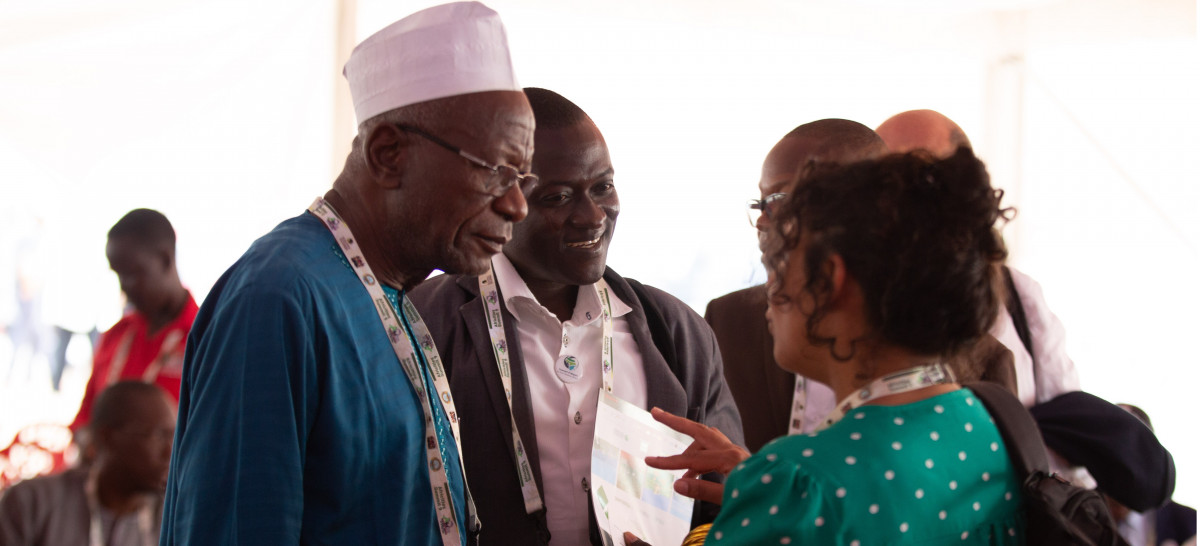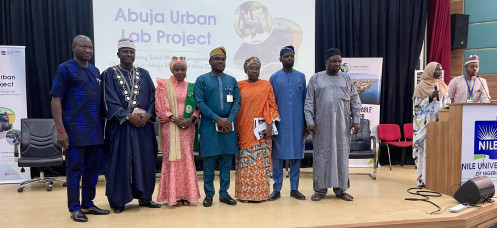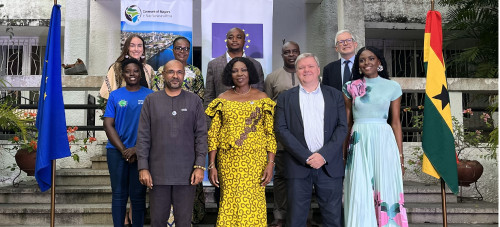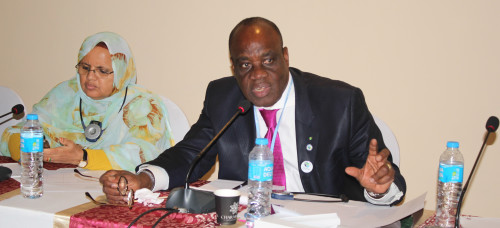CoM SSA advocates for the financing of waste projects of African local authorities at the Africities Summit 9
Published: 1 Jun 2022

The Covenant of Mayors for Sub-Saharan Africa (CoM SSA) and its implementing partner Expertise France decided to highlight the cross-cutting issues of climate, energy and waste management in African cities during two technical sessions at the Africities Summit with representatives of CoM SSA signatories, climate experts, civil society, technical and financial partners and specialised lawyers were able to dialogue.
What is the link between waste management and climate-energy planning in African cities and why should it capture climate finance?
Waste management, which is traditionally the responsibility of local and regional authorities, is a major challenge in addressing climate issues in Africa. “In Africa waste is responsible for 8.1% of greenhouse gases (GHG) emissions while the global average is 3%” said Audrey Guiral-Naepels, Deputy of the Urban Development, Planning and Housing Division of the Agence Française de Développement.
This is an observation shared by several CoM SSA signatory cities: waste is regularly found in the main sources of GHG emissions. For example, according to the baseline emission inventories conducted in Bamako (Mali), Kisumu (Kenya), or Kloto 1 (Togo), the waste sector solid and liquid is still one of the top three most GHG-emitting sectors with 17%, 3%, and 7% of total GHG emissions, respectively.
During the first technical session, participants understood how untreated waste can account for up to 50% of GHG emissions in African cities. Indeed, the decomposition of organic waste, which reaches almost half of all waste, when left untreated, releases large quantities of carbon dioxide and methane that contribute to global warming. Yet, this waste could be used to produce biogas or compost, as Dominic Kahumu Wanjihia, founder of Flexi Biogas, a company that produces and supplies biogas from water hyacinth on Lake Victoria and organic waste from the Kisumu’s lakeside restaurants. Other waste, such as plastic, paper or metals, is sorted to be recycled or recovered. Waste recovery could reduce waste production by 80%, according to Michaël Toma, Director of MT Partenaires Ingénierie, a specialist in climate, air, and energy issues in France. He also demonstrated how the different types of waste treatment, such as incineration, burial, and uncontrolled or organised landfill, affect the amount of GHGs and the risks generated to human and environmental health.
Awareness of the significant climate and sustainable energy co-benefits of waste projects is a major challenge
The waste prism must be taken into account in local climate planning and action to address a comprehensive and rapid response to the climate emergency on the continent.
African cities have decided to take charge of waste management within their territories in response to these challenges. Several of them, such as Lomé in Togo and Nouakchott in Mauritania, shared their experience by presenting their waste projects during a session dedicated to success stories on waste projects in the continent.
Tchalim Tagba, General Secretary of the Lomé District, showed how the District has been reorganizing the solid waste management sector since 2008 with the support of AFD, the European Union and the West African Development Bank. After working on eliminating illegal dumps and creating a pre-collection and collection system, a large technical waste landfill was commissioned in 2018 and has, so far, treated more than one million tons of household waste on a secure site to protect the environment and the water table. The programme also includes the production of biogas on the site and the installation of a photovoltaic farm on the former landfill. The treatment and recovery of waste through this programme would save up to 50,000 tons of CO2/year.
The municipality of Nouakchott, which is implementing a pilot waste management project in the framework of CoM SSA, had to face major challenges in this area. Facing an increasing number of illegal dumpsites, the repeated practice of waste incineration and rainwater drainage disruption, the municipality tested several approaches, starting with one-off clean-up and awareness-raising actions. However, a high level of ownership and the mobilization of the population on this issue allowed the local government to develop a participatory approach that included the civil society, public authorities, and the private sector. The municipality took advantage of that momentum and created a waste sector regulation that better integrates this issue into the city's strategic planning documents. This co-constructive approach has led to a significant improvement and to an efficient and sustainable waste management. Emine Ebaye, CoM SSA Focal Point in Nouakchott, insisted on the need of having “a detailed knowledge of the local context and reliable data to program and promote ambitious, but above all, realistic actions” in the waste sector. According to him, these conditions were essential to "optimise the impacts of the technical and organisational management of waste in Nouakchott” by relying on "a participatory approach combined with a technicality involving a sustainable operating plan for the various infrastructures."
In the same direction, the city of Tchaoudjo in Togo showed, through its Director of Tchaoudjo Technical Services, Essossinam Ketetche, how a small town could also address the issue of liquid waste management, based on dialogue with the population and civil society. Their sludge treatment plant was built on the basis of a latrine construction project carried out by local NGOs. With the support of the African Water Facility, the African Development Bank and the State of Togo, the municipality structured a collection, transport and disposal system for liquid waste, and built its treatment plant. A lot of work has been done to set up a sustainable management system by acting on all the links in the chain, from raising the awareness of the population to structuring neighbourhood sanitation committees or strengthening the capacities of small companies in charge of collecting, transporting, and treating the sludge. In addition, in partnership with a local NGO, the commune has started an experiment on composting from the sludge and solid waste collected. Nowadays, it can produce up to 4.5 tons of compost per month, which is used for market gardening activities.
What are the success factors for this type of project?
Three key elements for success emerge from these experiences: reliable data collection to have a solid knowledge of the territory and to plan activities on a scientific basis, a participatory approach to co-constructive actions with citizens, public authorities and the private sector, and access to financing, which remains a key issue for African local authorities, and to which access to climate finance could provide an interesting response, given the close links between waste and climate in Africa.
Through this type of sessions, CoM SSA allows its signatories to promote their projects on the international scene, but also to network and share best practices and lessons learned. “Each country, although from different backgrounds, is converging towards a single objective: to fight climate change and ensure access to sustainable energy. These sessions allowed us to identify the strong links between waste and climate, and make the link between the actions of cities in the continent and what we can also do on our territory. Indeed, in Segou, one of the pilot projects of our climate plan aims to recover the waste from our controlled landfill”, stressed Aoua Traore, CoM SSA Focal Point of the Intercommunal of Balanzan in Mali, during the CoM SSA Sessions event.





